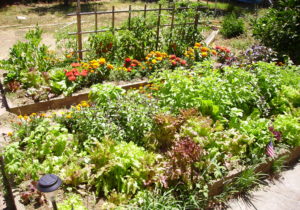ELCA World Hunger is excited to welcome back Ed Merrell as a guest blogger. Ed previously wrote a series of Fall tips for your garden for the ELCA World Hunger blog.
Ed is an Independent Seeds Professional. He engages with seed-centric charity organizations and other agricultural groups. In this capacity, he applies his extensive seed industry skills and experience to provide relevant information and solutions.
His 35+ year career in the vegetable and flower seed industry included plant breeding to develop new and improved varieties, domestic and international seed production, quality assurance and seed testing, seed processing plant operation, and quality information systems. Ed is a member of Advent Lutheran Church (ELCA) in Morgan Hill, Calif. This post also appeared in the Spring 2017 issue of Seeds for the Parish.
After a long winter of colder temperatures, gray skies, and hopefully sufficient rain and snow to replenish the earth, many of us are looking forward to longer days and our next gardening season! Here are some tips for a bountiful, healthy community garden:
- Start planning early.
When snow still covers the ground and spring seems so far away, it’s great time to plan your first or next community garden! Aim to be ready before your first sowing date. Visit ELCA.org/hunger/resources to download ELCA World Hunger’s “Community Gardens How-To Guide,” filled with tips from community gardeners across the ELCA. Click on the “Hunger Ed” tab to download or order the guide.
- Has your community garden vision changed?
Were you able to accomplish what was planned? By matching your communities’ needs with your resources, the gardeners and the community will be energized. Not too small a garden that may not keep everyone engaged, not too large a garden that may be frustrating, but just right!
- Get the word out!
Notify all your gardeners that the planting season is coming, and they can help prepare. Form a team to review last year’s garden, decide what to continue and what to change. Last season’s planting map will help you rotate crops effectively. Maybe you want to build or repair raised beds, trellises, or compost bins. Another team can assess the garden’s fertility and add soil amendments and fertilizer as needed.
- Extend invitations
Recruit new gardeners and/or new partners for the coming season. More hands make lighter work, expand what the garden can produce, and grow enduring friendships.
- What new vegetables are you longing to try?
Seed companies introduce new varieties every year. Explore online, see what’s new or request a catalog to enjoy the photos and descriptions. Did you know that there are seed exchange libraries and seed swaps? A seed library is a place where community members can get seeds for free or for a nominal fee and is run for the public benefit. Seed swaps are events where gardeners meet to exchange seeds. Maybe there’s one in your area, and you can find just the variety you want.
- What to plant really early?
Use hot caps, row covers, or mulch to expand your planting window. These products hold heat from the sun and enable germination and growth to occur even when it is otherwise too cold to plant outside.
- Ask an expert
Remember to tap other resources. Local cooperative extension services and Master Gardeners can provide advice on soil fertility, plant varieties adapted to your area and pest control. Garden supply stores may donate tools or supplies, if you ask them.
- Expand your planting ideas
What about flowers? They bring color to a garden and, when picked, they brighten homes and places of worship.
- Is your garden space committed for the long haul?
If your community garden space will be available for years to come, consider planting fruit trees and berry bushes. They do require space to grow, maintenance such as pruning, and it may be a few years until they bear fruit. However, once established, they will produce for many seasons.
- Is there a quiet place in your garden?
A comfortable bench set in a quiet spot in the garden can be a perfect place for meditation and prayer. Gardeners may rest from their labors and visit with others. Perhaps install a trellis with climbing plants for some shade.
For more information, get a copy of ELCA World Hunger’s Community Gardens How-To Guide.
Now that you have everything ready, it’s time to plant!

